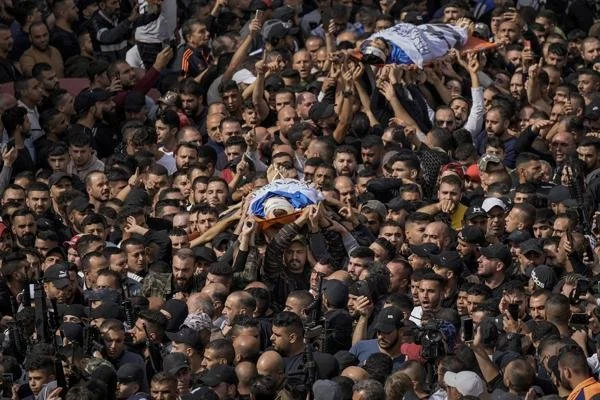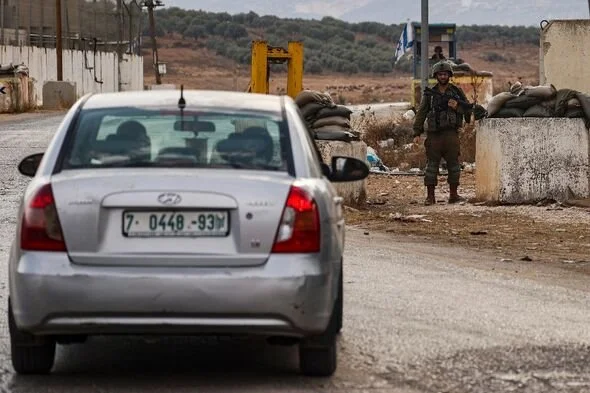Five Palestinian Militants Killed in an Israeli Raid in the West Bank
Thousands of Palestinians attended the funeral of six Palestinian militants killed by the IDF Tuesday morning. Photo: AP News/Majdi Mohammed
Tensions in the West Bank have risen again after Israeli security forces killed five Palestinian militants in the city of Nablus on Oct. 25. According to Palestinian health officials, over 20 Palestinians were also injured in subsequent clashes.
In the early hours of the morning, Israel Defense Forces (IDF) soldiers exploded a suspected weapons manufacturing site used by the Palestinian group Lions’ Den, which Israel claims is responsible for multiple terrorist attacks and the killing of an Israeli soldier last month.
One of the group’s leaders, Wadee al-Huh, was among those killed. Video footage circulating from Tuesday showed violent clashes between IDF personnel and Palestinians as well as burning vehicles. As word spread of the operation, many of the city’s residents began protesting the IDF’s presence by throwing rocks and scattered materials at Israeli security vehicles.
Clashes between the IDF and Palestinians in the West Bank have increased dramatically throughout the year, resulting in the death of over 125 Palestinians and four IDF soldiers. The raid in Nablus is the most recent of Israel’s Operation Breakwater, a response to a series of deadly terrorist attacks carried out against Israel in the spring.
At least 19 Israeli civilians and security personnel were killed in the deadliest terrorist attacks Israel has seen since the second intifada in the early 2000s.
The perpetrators traveled into Israel from northern cities in the West Bank, including Nablus, Jenin, and Hebron. The Lions’ Den group formed nearly a year ago as a militant resistance group independent from other Palestinian factions like Hamas and Palestinian Islamic Jihad.
Groups like Lions’ Den have challenged the legitimacy of the Palestinian Authority (PA) and prompted demands from Israel that PA security forces increase efforts to repress armed resistance from within.
The reaction from Palestinian officials and media has been extremely critical. PA President Mahmoud Abbas, colloquially known as Abu Mazen, accused Israel of war crimes.
A spokesperson for Abu Mazen’s administration announced that his office is establishing “urgent contacts in order to stop this aggression against our people.” The PA has consistently opposed Israeli incursions into the West Bank and officials have recently called on the U.S. to de-escalate the situation.
Political leader Ismail Haniyeh of Hamas, the Palestinian terrorist group that controls the Gaza Strip, warned that Israel will regret its crimes against Palestinians.
In a statement, Haniyeh asserted Hamas’ support for the militants; “The blood of the martyrs in Nablus and these sacrifices will only fuel the resistance.” Thousands of Palestinians gathered for the funeral of the five Palestinians killed in Nablus and a sixth killed the same night in Ramallah.
A Palestinian car crosses a checkpoint in Nablus. Photo: AL-MONITOR/ Jaafar Ashtiyeh
Israel argues that it cannot allow concessions when it comes to security. Defense Minister Benny Gantz maintained that “There is no refuge, and there never will be for terrorists…We will continue to act against anyone who tries to harm Israeli citizens in any place at any time needed.”
Israel’s prime minister Yair Lapid stated on public radio that, “Israel will never be deterred from acting for its security… the moment they hurt us, IDF soldiers and Israeli civilians, they should know it will end badly.”
Although Israel has put pressure on Abu Mazen to implement more robust counterterrorism methods, the IDF will likely continue to engage in operations in the West Bank.
Following the unrest in Nablus, the IDF has enforced a blockade around the city, angering Palestinian residents that consider it collective punishment. The military argues that it must contain the rise of terrorism within Nablus, but Palestinians argue it has inhibited every aspect of daily life.
One shopkeeper estimated that he has lost roughly 1,500 shekels per day since the blockade, about 430 U.S dollars. The city’s mayor, Sami Hijawi criticized that the “siege” has disrupted the local economy, access to medical care, and education. Al Najah University instructed over 25,00 students to continue remotely, and the Palestinian chamber of commerce estimates that its economy is exporting a mere 20 percent of normal output.
Clashes in cities across the West Bank have only become more violent. With the PA and Israel at odds, there is no clear sign that security cooperation between the two can be negotiated.


